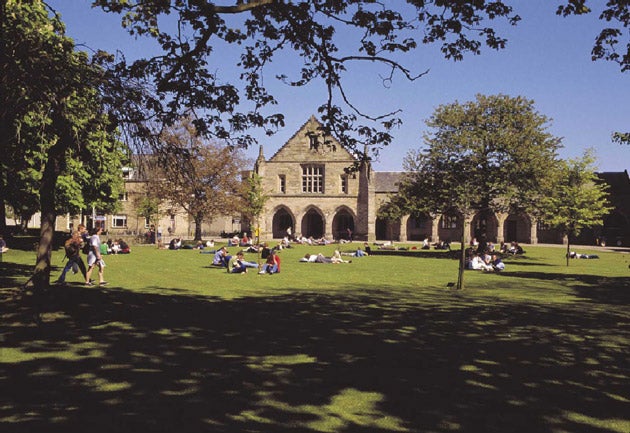Students get new courses for the 21st century
Aberdeen is the first British university to carry out a thorough review of what it teaches. But, asks Lucy Hodges, will the customers like it?

In 1495 a medieval bishop established a university in the small northern Scottish port of Aberdeen, famous today for its bracing climate and offshore oil. Columbus had just discovered America and witches were still burnt at the stake.
Some 500 years on, the University of Aberdeen is anxious to make its mark and to push itself up the domestic and international league tables. At present it languishes in 47th position (out of 113) in The Independent's Complete University Guide, eight places lower than last year. One way it can raise its game is by a radical reform of its undergraduate curriculum along the lines of what has happened at Harvard, Melbourne and Hong Kong universities – and that is what it is doing. Its ambition is to climb into the top 100 universities in the world in The Times Higher's international league table, where this year it is in 129th place.
Aberdeen claims to be the first British university to undertake such a comprehensive review. From 2010, students will be able to take new cross-disciplinary programmes, called "Sixth Century" courses, with headings such as "Humans and other animals", "Health and wealth of nations" and "Science and the media". The idea is to make what students study relevant to today's issues by both broadening and deepening what they learn by setting it in a wider context.
Alternatively students may study other programmes, such as a language, a business or a science, alongside their main degree subject. Or, finally, they may take an extra course that interests them but is separate from their main discipline.
For example, students taking anthropology with history and sociology, might also want to study some archaeology or biology. They would be able to choose from the whole undergraduate offering.
"There were questions it was our professional duty to ask, such as whether the curriculum was preparing students for citizenship and leadership," says the principal, Professor Sir C Duncan Rice. "I was very lucky in that the academics all responded rather well. We looked very closely at Melbourne in particular and were able to imitate them."
Melbourne had a radical rethink of what it teaches, throwing out more than a century of academic tradition, and last year introduced six new broader degrees in arts, biomedicine, commerce, environments, music and science. All professional training was moved to the postgraduate level, as happens in the US.
The Aberdeen reformers learnt an important lesson from Melbourne – and that was to consult as widely as possible with staff, employers and students. The vice-principal Bryan MacGregor, who chaired a curriculum commission, took his cue from the principal who was adamant that he didn't want to drive through change himself from the centre but to leave the academics in charge of reform. There were a series of sub-groups and a steering group that took evidence.
Visits were made to Harvard and Yale, Hong Kong, and to Australia. Melbourne had been very clever at rebranding itself and generating a lot of hoopla about the change. Aberdeen wanted to do the same.
Although its reforms have not been as radical, it has followed some of the same principles as Melbourne such as giving students a pretty free choice, setting each discipline in context, and creating a flexible structure so that students can enter and exit programmes more freely.
The only faculty that refused to adopt the changes was medicine, which means that medical students carry on with the curriculum they have. However, Professor Jim Anderson, a member of the commission, opposed the notion that you lose depth if you embrace breadth. "It's all about how well you teach," he says.
The Scottish government has been an enthusiastic supporter. According to Fiona Hyslop, Cabinet Secretary for Education and Lifelong Learning, the changes will bring a host of benefits to students. "The university is helping to increase their future career and study options."
It could be 15 years before Aberdeen reaps the rewards, but the academics believe it will. "It would be nice to be attractive as a venue for undergraduates to come – and not just from the local area," says Professor Anderson.
Certainly students from England will have another reason to come to Aberdeen apart from the fees, which are lower in Scotland than south of the border. Rachel Sandison, head of student recruitment, says word is getting out that Aberdeen has modernised what it teaches, which is one reason why applications are up.
The students are enthusiastic. "One good aspect is that students were involved from the start," says Robin Parker, president of the students' association. Putting it into practice will be a challenge, he believes. "But I am hopeful the new courses will inspire people to come here."
Join our commenting forum
Join thought-provoking conversations, follow other Independent readers and see their replies
Comments
Bookmark popover
Removed from bookmarks